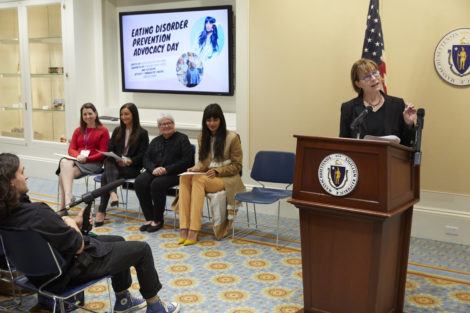November 22, 2019—“We aim to create a healthier environment for young people and, someday, a world where children of all genders can grow up at home in their own bodies,” Harvard T.H. Chan School of Public Health’s Bryn Austin told an audience of eating disorder prevention advocates, state legislators and staff at the Massachusetts State House on November 21. Austin, professor in the Department of Social and Behavioral Sciences and director of STRIPED (Strategic Training Initiative for the Prevention of Eating Disorders), was there with actor and activist Jameela Jamil to lead a legislative briefing and advocacy effort in support of two bills filed by State Rep. Kay Khan (D-Newton) that aim to address diet culture and its potentially toxic effects on young people:
- H.1942 seeks to prohibit the sale of diet pills and muscle-building supplements to minors and to require retailers to store the products behind the counter or in locked cases.
- H.3892 would provide an annual tax credit for cosmetic, personal care, and apparel companies that do not use digitally altered advertisements.
In the U.S., 20 million women and 10 million men across all racial and ethnic groups and socioeconomic statuses will struggle with an eating disorder at some point in their lives, according to the National Eating Disorders Association (NEDA). Studies have shown that exposure to media that promotes a thin ideal body type results in measurably increased eating disorder symptoms.

Speaking at the event, Jamil described her 20-year struggle with an eating disorder, and the lasting toll it has taken on her health, including to her heart, liver, and kidneys. “I will spend the rest of my life and career making sure that no one else ends up like me,” she said. A star on the TV show “The Good Place,” Jamil also is an activist who promotes inclusivity through her online platform I Weigh, and speaks out against celebrities who promote “detox” teas and other potentially harmful diet products on social media.
“Because I am part of a toxic industry, it is my duty, my emotional carbon footprint, to make sure that we unravel the web of lies and pull back the curtain and show people how much nonsense this all is,” she said.
Jamil’s advocacy helped lead Facebook and Instagram to announce this fall that they would impose age restrictions on some posts related to diet products and cosmetic surgery. Through I Weigh, she will be working with STRIPED to promote research, education, and advocacy around eating disorders.
At the legislative briefing, Kristine McMillan, a nurse, moved the audience with the story of her own eating disorder, which she kept hidden through college and into the start of her career and family. “I was thriving in life while medically and mentally struggling,” she said. She finally resolved to get help, she said, after her 12-year-old daughter found her passed out on the floor. She now works to help others struggling with eating disorders.
Also speaking at the event was Amanda DeStefano, chief clinical director of Multi-Service Eating Disorder Association (MEDA), an organization adding its support to the bills. Other partnering organizations include NEDA, My Power People, and Be Real USA.
Following the briefing, volunteer advocates, many with their own stories of recovery from eating disorders, fanned out across the State House to meet with legislators and staff.
A new study led by Austin was also released on November 21 linking use of diet pills and laxatives for weight control with later eating disorder diagnosis.
Photos: Kent Dayton
